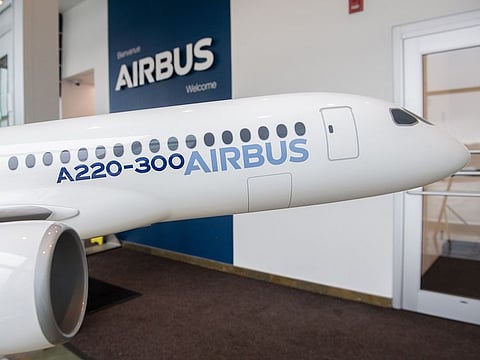Global aircraft fleet to double to 48,230 planes in 20 years, says Airbus
Middle East carriers would require 3,740 planes

Dubai: French plane maker Airbus predicts the world will have 48,230 planes by 2043, compared with 24,240 at the beginning of this year.
Airbus’s latest 2024 Global Market Forecast (GMF) states that nearly 45 per cent of all new deliveries will be to replace older, less fuel-efficient aircraft.
The demand for aircraft follows the forecast that global air travel demand is expected to more than double by 2043, recovering from COVID-19 and as economies expand. Airbus said a significant portion of this demand would come from the Asia Pacific region.
APAC region leads demand
The new fleet will include passenger aircraft with over 100 seats and freighters with over 10 tonnes of payload. Of these, 33,510 will be single-aisle, and 8,920 will be wide-body planes.
More than 45 per cent of the demand - 19,510 planes - will come from the Asia-Pacific and China markets, according to the GMF.
“China and India, and more generally Asia-Pacific as a whole, will power growth, further shifting aviation’s centre of gravity’ towards Asia,” said Airbus.
The Asia-Pacific region, excluding China, will require about 23.2 per cent (9,990 planes) of the new aircraft, while China will demand approximately 23.1 per cent (9,520 jets).
Following these, Europe and the CIS region will need 8,050 planes, North America 7,100, Latin America 2,570, the Middle East 3,740, and Africa 1,460 planes.
Demand for travel
“Over the last four years, air transportation has again proved its resilience through the deepest and longest crisis in its history. Now, traffic and airline operations are broadly back to pre-COVID levels or higher with a few exceptions,” said Airbus.
Expanding economies and populations, a growing middle class, improved infrastructure, and traffic stimulation from airlines offering new affordable flights have been listed as contributions to robust air traffic growth.
“People want and need to fly. Aviation connects people, is a catalyst for trade, enables commerce, and supports communities,” the French OEM said.
Aircraft replacement
Around 45 per cent of new deliveries are expected to replace older and less efficient aircraft, amounting to 18,460 planes.
“Replacing older aircraft with newer, more efficient ones is the quickest way to reduce fuel burn per RPK (revenue passenger kilometres). The sector has achieved a 53 per cent CO2 reduction per RPK since 1990 due to technological and operational improvements,” the Toulouse-based company said.
Sign up for the Daily Briefing
Get the latest news and updates straight to your inbox



